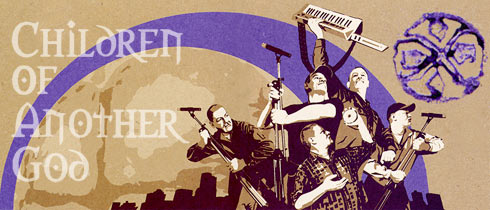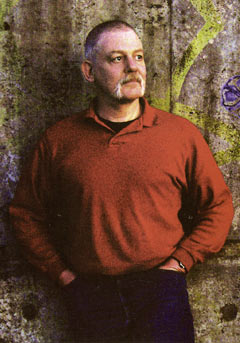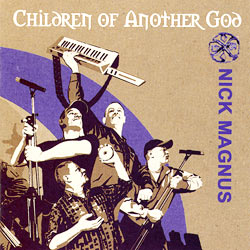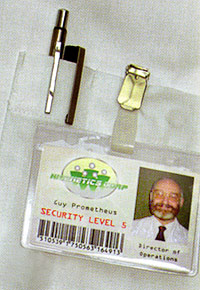


Nick Magnus?! If you know this name you will probably link it to Steve Hackett in some way. In fact, Magnus played the keyboards in Steve Hackett's band from 1978 to 1989, that is on the twelve records from Spectral Mornings to Feedback '86. Before that he was a member of The Enid (symphonic rockmusic) in 1976 and the prog-rock band Autumn. He gained lots of experience working as a session musician for celebrated artists such as George Martin, Brian May, Mike Batt and Chris Rea. Another aspect of his musical career consists of commercially successful utility music (Project D Synthesizer, Pan Pipe Moods and more).

Children Of Another God is Magnus' fourth solo album. While his first record was more or less easy listening its successor already went in the prog direction. His third album continued a trend that is confirmed on the current CD.
Children Of Another God is a concept album about the conflict between uniformity and diversity. Magnus explain that it was Darwin's idea that diversity is the factor for survival. While uniformity creates power it is only diversity that brings progress. The main subject of the album is the battle between these extremes. Says Magnus: "Trying to make people all the same (in other words, forcing the idea of 'normality' on society) is not A Good Thing. Diversity, on the other hand, is a very positive Darwinian idea - adapt and change to flourish and survive. Uniformity can be very beautiful (flocks of birds and shoals of fish all moving as one) but it is often very negative (Nazis, football hooligans, cults and religious fanatics). The album attempts to illustrate this with a story, following one character who is assimilated into a uniform group of ten others, and what becomes of them."
 As on Hexameron a number of renowned guest musicians appear on this album. Steve Hackett (guitar), Steve's brother John (flute) and another former member of The Enid, Glen Tollett (double bass) assist the instrumental department. Pete Hicks (former singer in Hackett's band), Tony Patterson (singer with ReGenesis), Linda John-Pierre and Andy Neve help out with the singing.
As on Hexameron a number of renowned guest musicians appear on this album. Steve Hackett (guitar), Steve's brother John (flute) and another former member of The Enid, Glen Tollett (double bass) assist the instrumental department. Pete Hicks (former singer in Hackett's band), Tony Patterson (singer with ReGenesis), Linda John-Pierre and Andy Neve help out with the singing.
Everything else was done by Nick Magnus himself. He played or programmed almost all the instruments himself, and he has done it so well that it the music sounds anything but synthetic. The odd time signatures in the drums are programmed with lots of variations, and numerous guitar solos give it all a rock atmosphere. But all the solos and all the guitars – except for one – are not really guitars. This was not because Magnus is one of those artists who feel the urge to do it all themselves but simply because of financial constraints.
Despite these inauspicious conditions the music is not at all synthetic, but melodious, varied and lively. If you would like to compare it with others you may think of names live Steve Hackett, Pink Floyd, Anthony Phillips, Marillion, Supertramp, Spock's Beard and the Alan Parsons Project, depending on the title.
These names represent very different styles of music: "Each track has its own distinctive flavour - I've tried to make the musical styles follow the changing moods of the story, a bit like scoring a movie. So it goes through a lot of dynamic variations, ranging from prog to rock to orchestral - but with an overarching 'prog' way of thinking behind the whole thing."
 The album consists of nine tracks; The Colony Is King merges into Crimewave Monkeys so that these two make up a single 13-minute piece, as it were. The overall theme becomes evident from the lyrics and is also reaffirmed by musical and lyrics reprise and anticipations. The lyrics were all written by Dick Foster while Nick Magnus wrote and arranged the music.
The album consists of nine tracks; The Colony Is King merges into Crimewave Monkeys so that these two make up a single 13-minute piece, as it were. The overall theme becomes evident from the lyrics and is also reaffirmed by musical and lyrics reprise and anticipations. The lyrics were all written by Dick Foster while Nick Magnus wrote and arranged the music.
1. Children Of Another God (8:24)
The album begins with ambience: An ethereal guitar sound a la Hackett comes in over unintelligible whispering voices with a hit at the main theme. The song proper begins very sudden, though unspectacular: Drums, guitar, electric piano and mellotron strings make up the foundation before Tony Patterson takes over the theme in his vocals and glockenspiel and more ethereal voices are added. The theme is very simple; too simple perhaps, when you first listen to it, though it really sticks in your mind when have heard it a couple of times.
The song itself appears rather simple, too, in the beginning, but it grows more complex later on. After several changes in rhythm and speed a middle section begins that is quietly romantic. Its choice of instruments and harmonies may remind you of the old times of Genesis and Hackett. After a brief return of the whispers Jeannie Farr and Dick Foster recite a couple of pertinent texts.
Their words “The colony is king” (which points forward to the fifth track) trigger a much rockier part with a dominant solo on the electric guitar. If you look into the booklet to find out whether this is Steve Hackett's performance you will be surprised to find that no guitarist is listed for the first song. Okay, you think, so they have messed it up, and it may seem like another funny joke that Nick Magnus plays the solo on a keyboard that is hanging on a guitar strap. One should take Nick's claim seriously, though, that “[t]here's no mistake in the booklet - apart from Steve's guitar on The Colony Is King, all the other guitars on the album are me on keyboards“ - and be astonished. Not only is this rock passage remarkably authentic, it is also most lievely. Hats off to the progress in technology that made all this possible, and hats off to the artist who made such competent use of it! After the solo Patterson sings on and the song ends quiet and instrumental with the main theme.
2. Doctor Prometheus (6:40)
The melancholy mood ends with a pop synth rhythm. Pete Hicks sings this song, and he sounds like Roger Hodgson from Supertramp at times. If you need a category, it sounds as if Supertramp in the Breakfast In America period had worked with the Alan Parsons project and produced an excellent song. Doctor Prometheus belongs to the simpler songs on the CD. It is pop, it has single potential, but it also has depth.
 The synth string solo is funny, particularly when it drifts into Oriental sounds briefly. Again we hear lots of rhythm and solo guitars – programmed ones (these solos were left out of the video). The very good line of „remorse? Remorse? I've heard of it, of course...“ should also not go unmentioned.
The synth string solo is funny, particularly when it drifts into Oriental sounds briefly. Again we hear lots of rhythm and solo guitars – programmed ones (these solos were left out of the video). The very good line of „remorse? Remorse? I've heard of it, of course...“ should also not go unmentioned.
3. Twenty Summers (4:04)
Cut: An intro of marimbas, accompanied and contrasted by the piano before bass, acoustic guitar and synthesizer come in – this is a typical prog instrumental that could have been written by Dave Greenslade. Most of it is in 10/8, though it is anything but regular because there occur lots of changes in both the signature and the speed. The middle section, if it can be called that, is rather quiet, which sets it off from the surrounding dialogue of a rock organ and electric guitars. Then the marimba motive from the beginning returns and the piece ends with solo piano.
One would never realize that this is fully synthetic and that Nick Magnus recorded all this on his own. It sounds like a typical prog instrumental from the 70s or 80s. The piece is therefore something of the odd one out, but it provides variation on the album.
4. Identity Theft (3:44)
Another cut, another complete change of atmosphere. So this is what Nick Magnus' voice sounds like. Not bad at all! A calm ballad in 6/8 with subtle strings, vibraphone and a (real) double bass. All this adds up to a soulful mood of some George Michael ballads. And it is reminiscent of a couple of Alan Parsons songs.
5. The Colony Is King (7:25)
It is very tempting to call The Colony Is King typical Hackett. It has lots of things that are characteristic for Steve's compositions: A sweet, mysterious melody, typical Hackett vocal phrases, a guest performance by Brother John and his flute, orchestral moments, lots of atmosphere and a typical guitar solo.
Such a description would do Nick Magnus wrong, though. If you listen to this album and its predecessor Hexameron you end up wondering which is the hen and which the egg: Has Magnus imitated Hackett's style? Or had Magnus perhaps helped create Hackett's style?
Whatever the answer to that question, he definitely does it as well as Steve, perhaps even better. But the song could have improved even more, for despite the promising beginnings it sticks to one theme and variations that are not too inventive:
Gently moving synth strings lay the foundation for Andy Neve's soft vocals until the theme of the song comes in for the first time, beautiful but mysterious because of its harmonies; it would take pride of place on every Hackett album, and it is played by John Hackett on the flute. The strings take it up and turn it onto an orchestral waltz with some variations. John's flute adds to that until the piece comes to a halt.
Suddenly a snare drum takes the lead accompanied by a mellotron choir. The theme returns, not as a delicate flute tune, but with the brutal insistence of Steve Hackett's guitar (this time it is really him!). His part is interrupted by the singing of a marching group that culminates in „Power to the colony!“ The song reaches its climax when Steve picks up the theme again and improvises in front of an impressive wall of sound.
Then it all suddenly stops. A variation of the orchestral waltz appears, the marchers repeat their song a capella (only with a snare drum) which makes it all the more insistent. The echo of their steps mixes with a police siren.
6. Crimewave Monkeys (5:30)
The police siren is actually the beginning of Crimewave Monkeys. Solo drums with lots of toms, and the odd sound effect. Then wide synthesizer sounds and another solo synth that sounds like a French horn. After almost two minutes of introduction the song proper begins with a repetition of the chorus. The verses pick up the marching rhythms from Colony... though the speed is higher.
 Crimewave Monkeys can be considered the second part of The Colony Is King; as far as its topic is concerned it is the opposite. Pete Hicks's voice and a rock organ rule this song. These things, the sudden change of rhythm and the ensuing keyboard solo resemble the music of Spock's Beard with Neal Morse.
Crimewave Monkeys can be considered the second part of The Colony Is King; as far as its topic is concerned it is the opposite. Pete Hicks's voice and a rock organ rule this song. These things, the sudden change of rhythm and the ensuing keyboard solo resemble the music of Spock's Beard with Neal Morse.
Several bars of solo drum that fade into emptiness bring Crimewave Monkeys to an abrupt end.
7. The Others (5:25)
After a moment of silence the music becomes measured and wistful. Linda John-Pierre's ballad is an immense contrast to the previous songs. It could have been written by Alan Parsons and Eric Woolfson or taken from a musical because of its orchestral arrangement. It could have hit potential if it were not too complex for that. But there are loads of beautiful melodies that come out really well with Linda's gentle but strong voice. A pure prog song this is not.
8. Babel Towers (4:53)
Back to prog rock. This song is as rhythmic as Doctor Prometheus, the music resembles Spock's Beard, but Babel Towers does not leave a lasting impression despite lots of good elements. The only thing that might stick is the instrumental reprise of the title theme that occurs after the question „Will there be any hope at all for us children of another god?“ The finale is fairly bombastic and flavoured with very accomplished (synthetic) guitar solos. It is a shame that the song simple fades out; there could have been better solutions...
9. Howl the Stars Down (3:49)
The album could have ended after the extensive repetition of the title theme, but Nick Magnus has another surprise for us:
A solemn introduction starts off a gentle, touching ballad full of sad lyrics and not much happier music in the verses. The (music in the) chorus turns it into something more positive, though. This very intimate sketch could have been written by Anthony Phillips. A very accomplished end to this album.i
At the end of the day: This is a very felicitous CD that is going to please not just prog-heads. Nick Magnus shows that he knows his business and is particularly good as an arranger. The album does not offer anything stunningly new – one has the impression that one has heard all this somewhere else before – but the quality of the compositions is excellent throughout.
He also proves that a keyboarder who has to do without real drums and most other instruments for financial reasons is still able to record a lively rock album. This album does not feel at all as if it had been produced on the computer.
It seem currently very unlikely but it would be great to hear this album live with real musicians and a real orchestra – it would sound even better then.
The videos that were produced for this album are remarkably good, considering the probably low budget. They are available on Nick's homepage and at Youtube; unfortunately, they are not on the CD.
by Martin Brilla
translated by Martin Klinkhardt (except for Nick's statements in direct speech)
